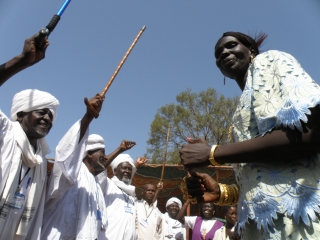Dinka-Misseriya Conference Overpowers Ghosts of Wartime Past
 |
Men and women of all ages participated enthusiastically in the Dinka-Misseriya conference. |
Fierce fighting broke out between the Dinka and Misseriya tribes in late 2007. The clashes raised fears that the conflict would spread further along Sudan's north-south border and jeopardize the fragile Comprehensive Peace Agreement (CPA).
Fortunately, cooler heads prevailed and grassroots plans for a Dinka-Misseriya Peace Conference emerged. During months of meticulous planning, the peace initiative grew to involve several hundred traditional leaders, peace activists, and state- and federal-level government representatives who gathered in mid-November for a three-day conference in the Northern Bahr el Ghazal capital of Aweil.
To assist this effort to consolidate the peace, USAID's Office of Transition Initiatives (OTI) facilitated the participation of key Dinka and Misseriya stakeholders in the conference aimed at improving relations between the neighboring communities.
The dialogues led to recommendations for strengthening peaceful coexistence during the dry season, when Misseriya pastoralists migrate south with their livestock into the Dinka homeland. Both tribes reaffirmed the importance of providing unarmed Misseriya with unhindered access to pasture and water points in Bahr el Ghazal, as well as the need for traditional policing groups to help maintain peace.
|
"…nothing can make us make our neighbors our enemies. While I am here, there will be no fighting again like last year. The enemies of peace will not get a chance."
—Governor, Northern Bahr el Ghazal
|
|
Some were disappointed that the participants were unable to resolve major grievances linked to CPA implementation. For example, delays in demarcating a large area of mineral-rich territory along the north-south border threaten to disrupt plans for national elections and Southern Sudan's referendum.
However, a series of joint development initiatives were proposed, ranging from the provision of mobile veterinary services to the dredging of the area's largest river. And the devastating effects of the country's protracted civil war, which pitted the two tribes against each other for decades, were openly discussed. In addition, Misseriya leaders pledged to cooperate with efforts to enable the return of Dinka women and children who were abducted during the war and remain in the North.
By working to mitigate conflict and promote development in contested border areas, OTI is helping Sudanese communities
find a peaceful way forward.
For further information, please contact:
In Washington, D.C.: Laura Chinn, Program Manager, Tel: (202) 712-1591, lchinn@usaid.gov.
|




